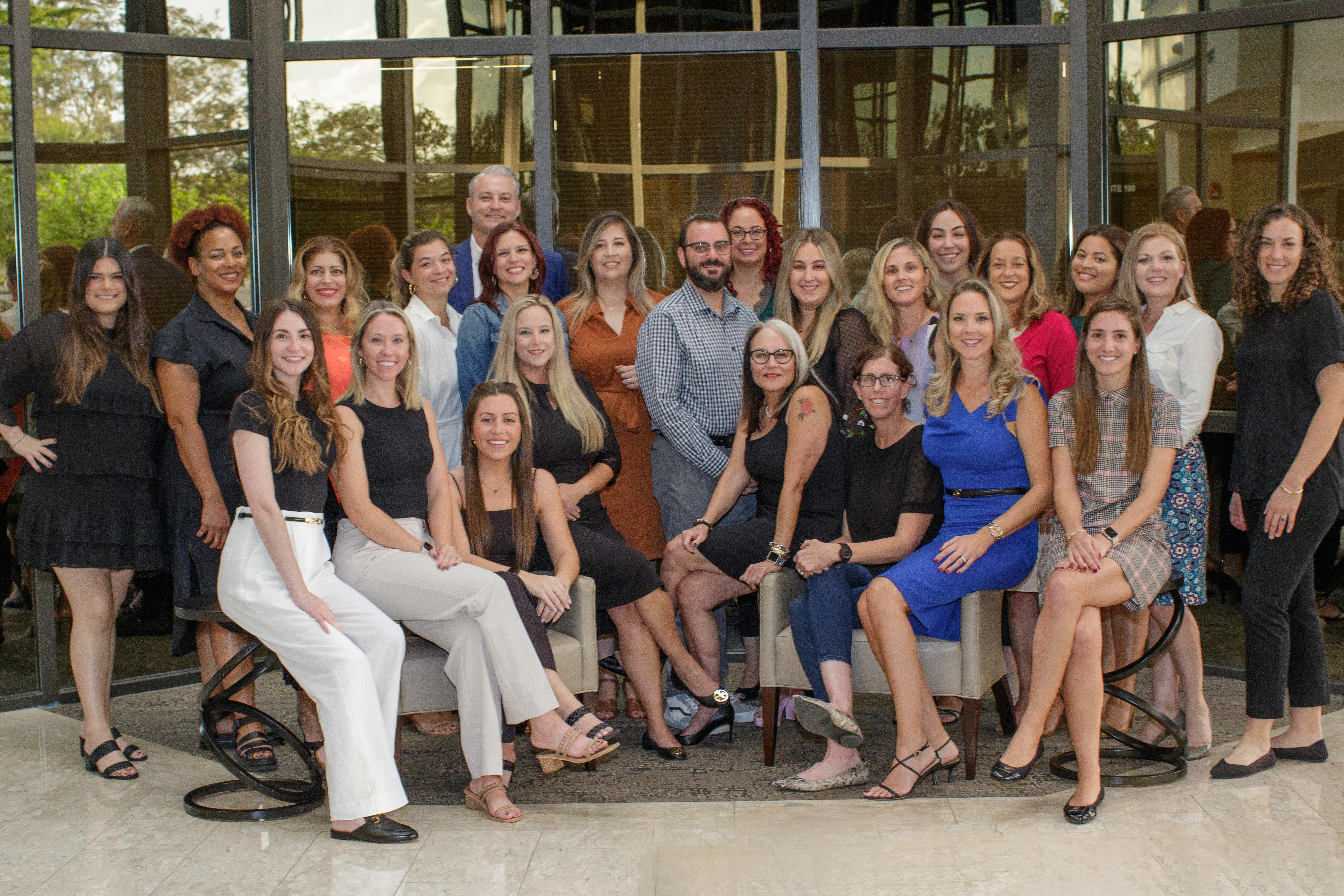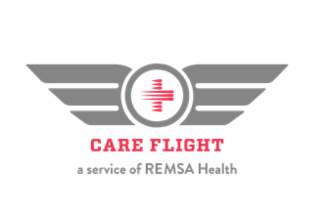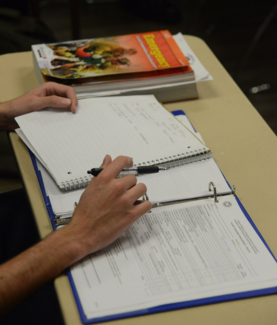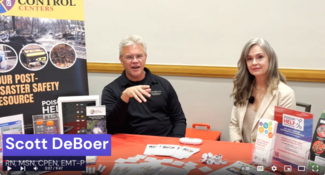First Responders Children’s Foundation Helps Families Cope With Loss and Stress
In the wake of the Sept. 11 terrorist attacks, more than 800 children lost a parent who died in the line of duty as a first responder. Al Kahn, deeply moved by the pain and loss these families endured, felt compelled to help.
On the following Thanksgiving, he organized a breakfast and Macy’s Thanksgiving Day Parade viewing party to bring comfort and joy to the grieving families. That single act of compassion became the foundation for what would grow into the First Responders Children’s Foundation (FRCF), a national nonprofit serving families of police officers, firefighters, EMTs, paramedics, 9-1-1 dispatchers, and corrections officers nationwide.

“Children of first responders live with a constant fear that their parent may not come home,” said Jillian Crane, CEO of FRCF. “They bear the weight of stories about loss, illness, and danger. This stress can have a profound impact, especially for those who lose a parent in the line of duty.”
The foundation’s mission is to support the mental, emotional, and financial well-being of these children and their families. Through programs in mental health resiliency, scholarships, bereavement assistance, disaster relief, and financial wellness, FRCF seeks to help young people heal, grow, and thrive.
FRCF is funded via individual donors and corporate partners. Those interested in donating or partnering with FRCF can do so through the website.
“Our need for services vastly outweighs what we are able to provide,” noted Crane.
Service Offerings
Crane noted that FRCF offers free and confidential counseling for children and young adults in a safe space through licensed mental health professionals trained to understand the specific struggles of first responder families. The program also features teen resiliency virtual workshops, among other offerings. Currently available in California, Florida, Hawaii, New Jersey, New York, Oklahoma, Tennessee, and Texas—and expanding, the counseling services are accessible 24/7 and require no insurance.
FRCF’s bereavement program offers critical financial support to families who have lost a first responder parent, helping with essential expenses and funeral costs.
“These funds can mean the difference between stability and crisis, covering essential expenses and the costs of funeral services,” Crane said. “Easing financial burdens allows grieving families to focus on what truly matters: finding a path toward healing. We classify suicide as a line-of-duty death, so families experiencing such a hardship are eligible for assistance.”
FRCF also offers emergency hardship and natural disaster relief financial assistance grants. Its newest initiative—financial wellness education—is designed to help families navigate these challenges and cover expenses such as childcare emergencies and medical costs.
“Research shows that only half of all first responders have an emergency savings plan in place,” Crane said. “Financial stress can lead to poor job performance, potentially jeopardizing public safety.”
Families can access the full range of services by visiting 1strcf.org.
Local Partnerships, Personal Connections
FRCF has partnered with south Florida-based Bayview Therapy, which provides specialized counseling for first responders and their families, helping them process the emotional weight of their roles, build resilience, and strengthen family connections. Similar partnerships have been made in the other states currently offering counseling services.

For the clinicians, the work is deeply personal. Dr. Kate Campbell, Bayview Therapy founder, noted “supporting those who protect and serve our communities isn’t just a professional mission—it’s a family tradition rooted in compassion and purpose.”
Her paternal grandfather, Marvin Andrew Mitchell, Sr., served in World War II and struggled with PTSD upon his return. Her father, Andy Mitchell, is chairman of the Broward Sheriff's Advisory Council, an organization supporting Broward County, Florida, first responders. Campbell’s husband, Brent Campbell, is the vice chair.
Sara Speed, LMHC, brings to Bayview Therapy her expertise as a certified first responder counselor and experience as the spouse of a firefighter/paramedic and combat veteran.
Speed focuses on the struggles first responders face: chronic exposure to trauma, empathy burnout, secondary trauma, family tension, and what she noted as escapist behaviors such as substance abuse or infidelity.
She and her husband share a daughter and have navigated together what it means to raise a child in a first responder household. Speed noted this perspective gives her the unique ability to connect with clients not just as a clinician, but as someone who understands the complex dynamics at play within these family systems.
“After decades of silence, the emotional toll of this work is finally receiving the attention it deserves,” she said. “But as the spotlight rightly shines on the psychological well-being of EMS professionals, we must not overlook the quiet weight carried by the people waiting at home—the spouses, partners, and children who are deeply affected by the ripple effects of this demanding line of work.”
How to Access Care
Bayview Therapy provides up to 10 free trauma-informed therapy sessions for first responders’ children and young adults ages five to 26. Families start by applying through FRCF.
“Once we receive a referral from their team, our client care coordinator reaches out to learn more about the individual’s needs, preferences, and goals for therapy,” Campbell said.
Clients are thoughtfully matched with therapists based on their needs, be it trauma, anxiety, grief, or family stress.
“We offer a safe, supportive space where children can talk about what they’re feeling, develop healthy ways to cope, and strengthen their sense of security,” Campbell said.
“For parents, we help build tools to navigate the unique pressures of parenting in a first responder household—whether it’s improving communication, managing stress, or finding ways to reconnect as a family. Ultimately, investing in the mental health and well-being of first responders and their families is essential for ensuring their long-term health and happiness.”
Bayview Therapy also offers secure telehealth sessions for individuals and families throughout Florida when in-person visits aren't feasible or preferred.
The Emotional Toll
Campbell noted that paramedics and EMTs are often the first on scene in the most critical, chaotic, and emotionally charged situations: car accidents, cardiac arrests, overdoses, traumatic injuries, even death.
“The intensity and unpredictability of the work, paired with long shifts, irregular sleep, and the constant demand to perform under pressure, can take a serious toll on mental health,” Campbell said.
Campbell noted that even when a first responder's call doesn’t seem to leave a mark in the moment, the cumulative impact of repeated exposure to trauma, crisis, and unpredictability can take a toll over time. Common challenges among EMTs and paramedics include chronic stress, anxiety, depression, post-traumatic stress syndrome, compassion fatigue, burnout, trouble sleeping, hypervigilance, mood swings, emotional withdrawal, and at times substance use as a way of coping. Others deal with nightmares, flashbacks, or persistent guilt, she said.
“The culture of being ‘tough’ or pushing through often makes it hard to talk about these struggles, leading many to internalize their pain or isolate themselves from loved ones,” Campbell said.
This emotional strain also ripples into their personal lives, Campbell noted, adding relationships can suffer and children may pick up on the emotional distance or stress their parent carries.
“What’s often overlooked is how these challenges affect their families—particularly their children,” Campbell said. “Kids may not always understand why their parent is missing dinner again or seems distant when they’re home.”
The emotional uncertainty, irregular schedules, and the stress of not knowing what each day will bring can leave children feeling anxious, insecure, or disconnected, which can impact their behavior, academic performance, and relationships.
“After hours on high alert, first responders often crash when they get home,” Speed explained. “This can make children and spouses feel rejected or unimportant—even when the parent’s behavior stems from exhaustion, not disinterest.”
Many first responders avoid sharing the intensity of what they witness daily, not out of secrecy, but out of love, Speed added. “They don’t want to burden their families with graphic details or emotional heaviness. This protective instinct, while well-intentioned, often creates unintended distance. Loved ones may feel shut out, unsure how to offer support, and over time, disconnected from the very person they’re trying to stand by.”
Another dynamic clinicians observe is the emotional crash that happens after a shift.
“After hours of running on high alert—fueled by cortisol and adrenaline—it’s common for EMS workers to come home feeling depleted, irritable, or withdrawn,” Speed said. “That crash can easily become associated with the home environment. A paramedic may walk through the door, scroll silently on their phone, or retreat to the couch—not out of disinterest in their family, but because their nervous system is still trying to reset.”
Unfortunately, spouses and children can internalize this behavior, Speed said. “They may feel like they’re not good enough, not interesting enough, or they’re somehow the cause of the disengagement. As misunderstandings grow, so does the emotional distance. What began as an attempt to protect the family can slowly evolve into a pattern of isolation, shame, and resentment for everyone involved.”
Without insight, awareness, and the right tools, this cycle can quietly erode relationships, often leading to outcomes such as emotional alienation, marital conflict, and worsening mental health for the first responder and their loved ones, Speed said.
“The good news is that this pattern can be disrupted with empathy, education, and intentional communication. Helping spouses and children understand what’s happening neurologically and emotionally for their loved one allows them to see these behaviors through a lens of compassion rather than personal rejection,” she said.
“At the same time, it empowers them to set healthy boundaries and safeguard their own mental well-being. First responders can also learn how to open up about their experiences in ways that create connection without overwhelming their families, inviting loved ones into their world just enough to foster understanding and closeness.”
Building Emotional Awareness
The ultimate goal is to recognize the first responder is not the only one living this job—their families live it as well, Speed noted. “The more attuned and supported the entire family system becomes, the stronger, more connected, and more resilient they all can be,” she added.
Speed pointed out that it’s essential to remember that while first responders may perform heroic acts, they’re still human, “no different from the rest of us when it comes to emotional vulnerability,” she said. “Day after day, they’re exposed to some of the most traumatic moments in people’s lives, yet they’re often expected to remain unaffected simply because they ‘signed up for it’ or ‘should’ve known what they were in for.’”
“These harmful messages ignore the reality that no amount of training can fully prepare someone for the psychological toll of repeated trauma,” she said. “There’s no way to predict how a person’s brain or body will respond to such intense, ongoing exposure to crisis and loss. That’s why the care and support offered through counseling must be just as unique and specialized as the demands placed on these professionals.”
Without tools and awareness, this dynamic can erode relationships. “The good news is that this pattern can be disrupted with empathy, education, and intentional communication,” Speed said. “Helping families understand what’s happening behind the behavior allows them to reconnect with compassion.”
Campbell said, “By addressing the full scope of the emotional impact, we help first responders and their families not just recover, but build resilience for whatever lies ahead.”
















